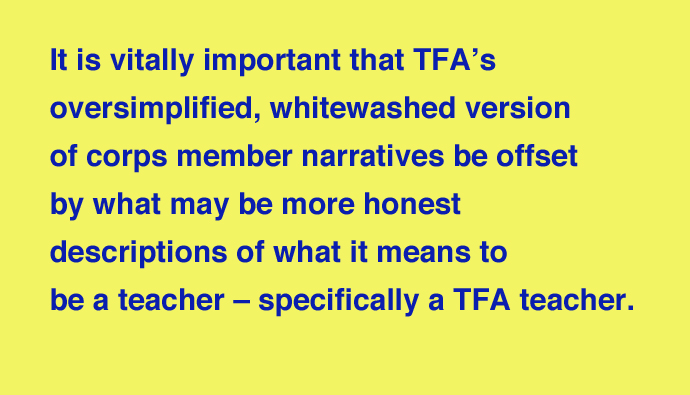Teach For America Counter-narratives: Two Alumni Books Reframe the Discourse - Living in Dialogue

By Jameson Brewer and Sarah Matsui.
What are counter-narratives? And why are they significant in the conversation? Counter-narratives are essentially “little stories” of individuals and groups of people whose knowledge and histories have been excluded from the telling of official narratives (Giroux, 1996, p.2). These localized “little stories” have the power to interrupt the grandiosity of the metanarrative, advocate for a fuller, more truthful representation of reality, and encourage new practices to emerge. Because “narratives, storytelling, and counter-narratives can be transformative and empowering for educators, students, and community members (Fernández, 2002, p. 60),” it is vitally important that TFA’s oversimplified, whitewashed version of corps member narratives be offset by what may be more honest descriptions of what it means to be a teacher – specifically a TFA teacher. If for nothing else, the existence and accessibility of counter-narratives provides a much-needed balance to the decades old single-sided rhetoric of education reform.
Two approaches
Both books – while centering on providing counter-narratives to TFA’s dominant narrative – approach the work in different ways. Brewer and deMarrais’ text, “Teach For America Counter-Narratives: Alumnis Speak Up and Speak Out,” provides a broad collection of voices from diverse alumni. Matsui’s text, “Learning from Counter Narratives in TFA: Moving from Idealism to Hope,” focuses specifically on Corps members (CMs) from TFA Greater Philadelphia’s 2011 and 2012 cohorts to explore patterns within a particular region, the impacts of TFA’s narrative on its own CMs, and the implications of the gap between TFA’s dominant narrative and these omitted counter-narratives.
*********************
Teaching has long been an embattled profession (Goldstein, 2014), and perhaps, has never really asserted itself as an actual profession (Harness, 2012). Not too disjointed from that, the discourse of schooling in the U.S. has largely been that of failure – a reality heightened since the Regan administration’s A Nation at Risk in the 80s. Then, and now, our society has largely bought into the idea of the failed school and has fit teachers squarely in the crosshairs of blame for that failure. As a result, and partnered with the growing narrative of the neoliberal imaginary that seeks to replace government-run entities with market-based reforms, many have called for the deregulation of teacher education, de-unionization of teaching, and harsher accountability measures to weed out so-called ‘bad’ teachers. And while TFA is certainty not credited with the genesis of pushing for the deregulation of teacher education or other accountancy measures, the organization has clearly capitalized on the idea. And therein lies TFA’s Teach For America Counter-narratives: Two Alumni Books Reframe the Discourse - Living in Dialogue:
